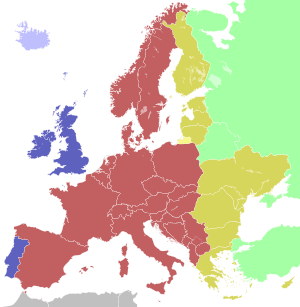Central European Summer Time
Central European Summer Time (CEST), sometime referred also as Central European Daylight Time (CEDT), is the standard clock time observed during the period of summer daylight-saving in those European countries which observe Central European Time (UTC+01:00) during the other part of the year. It corresponds to UTC+02:00, which makes it the same as Eastern European Time, Central Africa Time, South African Standard Time and Kaliningrad Time in Russia.[1]

| Western European Time / Greenwich Mean Time (UTC) | |
| Western European Time / Greenwich Mean Time (UTC) | |
| Western European Summer Time / British Summer Time / Irish Standard Time (UTC+1) | |
| Central European Time (UTC+1) | |
| Central European Summer Time (UTC+2) | |
| Eastern European Time / Kaliningrad Time (UTC+2) | |
| Eastern European Time (UTC+2) | |
| Eastern European Summer Time (UTC+3) | |
| Further-eastern European Time / Moscow Time / Turkey Time (UTC+3) |
Names
Other names which have been applied to Central European Summer Time are Middle European Summer Time (MEST),[2] Central European Daylight Saving Time (CEDT),[3] and Bravo Time (after the second letter of the NATO phonetic alphabet).[4] It is also in practice called CET, for example in invitations to events during the summer.
Period of observation
Since 1996, European Summer Time has been observed between 01:00 UTC (02:00 CET and 03:00 CEST) on the last Sunday of March, and 01:00 UTC on the last Sunday of October; previously the rules were not uniform across the European Union.[5]
There are plans to abandon summer time in Europe from 2021.[6]
Usage
The following countries and territories regularly use Central European Summer Time:[7]
- Albania, since 1974
- Andorra, since 1985
- Austria, since 1980
- Belgium, since 1980
- Bosnia and Herzegovina, since 1983
- Croatia, since 1983
- Czech Republic, since 1979
- Denmark (metropolitan), since 1980
- France (metropolitan), since 1976
- Germany, since 1980
- Gibraltar, since 1982
- Hungary, since 1980
- Italy, since 1968
- Kosovo, since 1983
- Liechtenstein, since 1981
- Luxembourg, since 1981
- Malta, since 1974
- Monaco, since 1976
- Montenegro, since 1983
- Netherlands, since 1977
- North Macedonia, since 1983
- Norway, since 1980
- Poland, since 1977
- San Marino, since 1966
- Serbia, since 1983
- Slovakia, since 1979
- Slovenia, since 1983
- Spain, since 1974 (except Canary Islands, which instead apply Western European Summer Time)
- Sweden, since 1980
- Switzerland, since 1981
- Vatican, since 1966
The following countries have also used Central European Summer Time in the past:
See also
- European Summer Time
- Time zone
References
- "CEST time now". 24timezones.com. Retrieved 2018-07-20.
- "Time zone names- Middle European Daylight, Middle European Summer, Mitteieuropaische Sommerzeit (german)". www.worldtimezone.com. Retrieved 2018-07-20.
- "CEDT - Central European Daylight Time: Current local time". Time Difference. Retrieved 2018-07-20.
- "B – Bravo Time Zone (Time Zone Abbreviation)". www.timeanddate.com. Retrieved 2018-07-20.
- Joseph Myers (2009-07-17). "History of legal time in Britain". Retrieved 2009-10-11.
- Boffey, Daniel (26 March 2019). "European parliament votes to scrap daylight saving time from 2021". The Guardian.
- "CEST – Central European Summer Time (Time Zone Abbreviation)". www.timeanddate.com. Retrieved 2018-07-20.